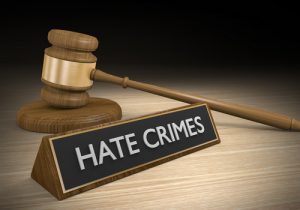
U.S. Reps. Fred Upton (R-MI), Dave Joyce (R-OH) and Vern Buchanan (R-FL) joined U.S. Sen. Jerry Moran (R-KS) last week to unveil a bipartisan, bicameral bill that would improve federal hate crimes reporting and widen assistance and resources for victims of hate crimes.
“More and more frequently, we are witnessing hate crimes across the United States, where individuals are targeted because of who they are. It’s wrong and horrific,” Rep. Upton said. “By improving reporting, supporting law enforcement, and creating hate crime hotlines, we can do more to end the surge of hate crimes in our nation. Hate has no place in southwest Michigan or around the country. Period.”
Reps. Upton, Joyce and Buchanan on April 8 led 20 other original cosponsors in introducing the Khalid Jabara and Heather Heyer National Opposition to Hate, Assault, and Threats to Equality Act, H.R. 2383, which was sponsored by U.S. Rep. Don Beyer, Jr. (D-VA).
Also known as the Jabara-Heyer NO HATE Act, H.R. 2383 specifically would provide incentives for hate crime reporting, provide grants for state-run hate crime hotlines, and establish additional penalties for individuals convicted under the Matthew Shephard and James Byrd, Jr. Hate Crimes Prevention Act, according to the text of the bill.
“This bipartisan legislation would take action to improve hate crime reporting, provide victims with support, prevent future hate crimes, and encourage entire communities to come together and heal from threats and violence motivated by bias,” Rep. Joyce said. “I am proud to be an original cosponsor of this bill and will continue to work across the aisle and show the American people that there are those of us in Congress who recognize the dire need to put aside partisanship and help heal divisiveness in our nation.”
The Federal Bureau of Investigation (FBI) released a report last year that showed hate crimes in the United States have risen to the highest level in more than a decade. However, in 2019, only 2,172 law enforcement agencies out of about 15,000 participating agencies across the country reported hate crime data to the FBI, according to Joyce’s office.
“With anti-Semitism on the rise, the United States needs to send a clear message that this odious form of hatred will not be tolerated,” added Rep. Buchanan. “However, hate crimes have often been ignored or underreported to the FBI. That’s why I support the NO HATE Act, which incentivizes local law enforcement to immediately report hate crimes to the FBI.”
Sen. Moran joined U.S. Sen. Richard Blumenthal (D-CT) in announcing their chamber’s version of the bill, which is expected to be formally introduced in the Senate on Monday.
“Violence is never acceptable, especially when targeted towards a specific community,” said Sen. Moran last week. “Hate crimes have no place in our society and this bill to improve reporting on the incidences in which they do occur is a step forward in better understanding how to address them.”
Sen. Moran added that the legislation also provides support and training to law enforcement. “As the lead Republican on the appropriations subcommittee with jurisdiction over the Department of Justice, I want to make certain our law enforcement have the tools they need to keep our communities safe for all Americans,” he said.
The bill would provide support to law enforcement agencies that establish a policy on identifying, investigating and reporting hate crimes; train officers on how to identify hate crimes; develop a system for collecting hate crimes data; establish a hate crimes unit within the agency; and engage in community relations to address hate crimes in that jurisdiction, according to a bill summary provided by the lawmakers.
Among several provisions in the bill, grants would be provided for states to establish and run hate crime hotlines and to redirect victims and witnesses to law enforcement and local support services to ensure that hate crimes do not go unreported and victims get the help that they need, the summary says.
The legislation also would permit judges to require individuals convicted under federal hate crime laws to undergo community service or education centered on the community targeted by the crime.
The bill is endorsed by numerous civil rights advocacy organizations and law enforcement groups, including the Heather Heyer Foundation, the Major Cities Chiefs Association, The Leadership Conference on Civil and Human Rights, the Arab American Institute, Asian Americans Advancing Justice, and the Anti-Defamation League, among others.



